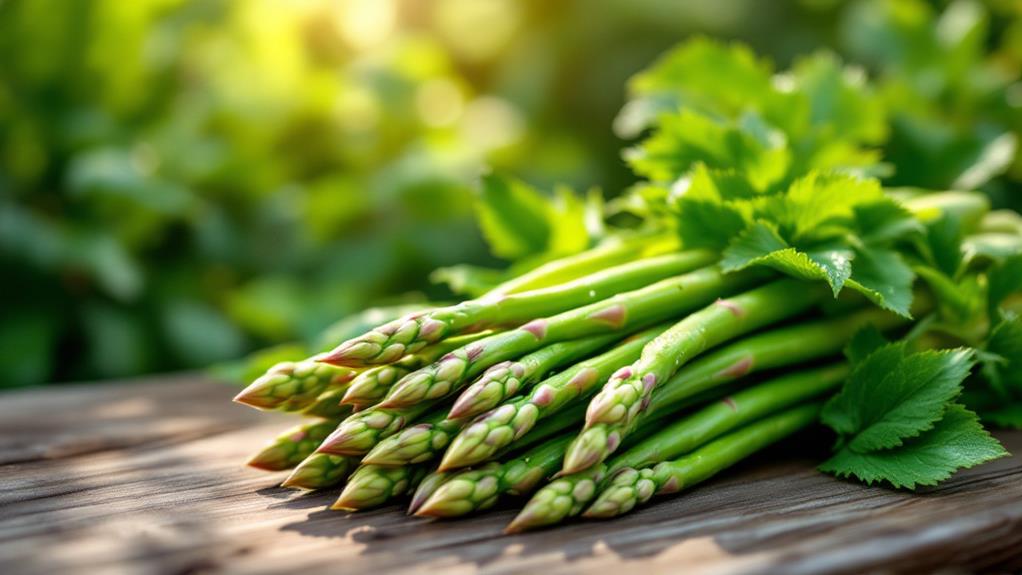The Health Benefits of Passion Fruit: A Tropical Superfood
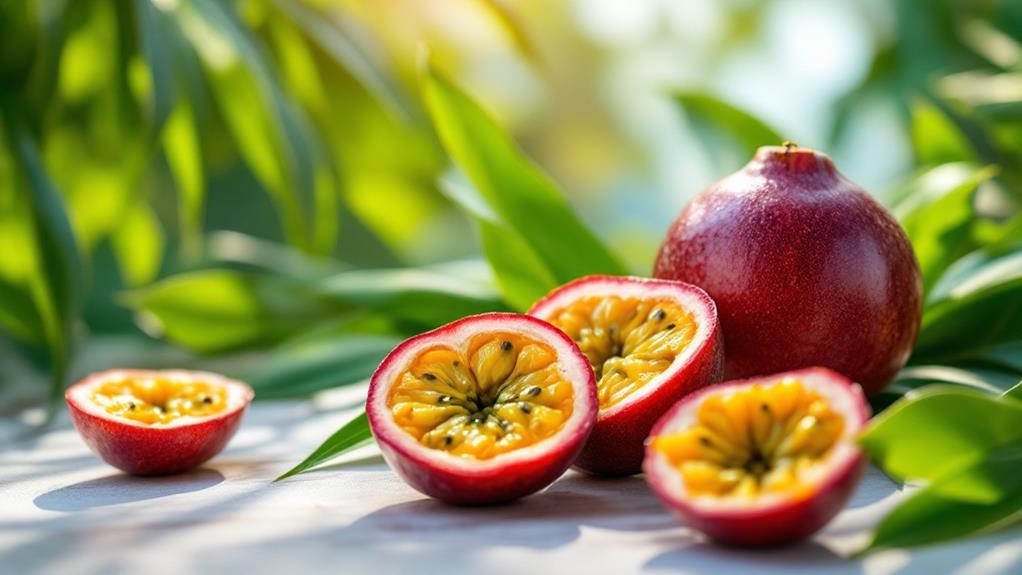
Passion fruit packs a punch with its health-boosting properties. At just 17 calories per fruit, it's a guilt-free snack loaded with fiber, vitamins A and C, and potassium. The antioxidants, like carotenoids and polyphenols, reduce oxidative stress and inflammation, supporting heart and metabolic health. Its low glycemic index helps maintain stable blood sugar, while its juicy pulp and edible seeds add a delightful crunch to dishes. Just be mindful of sugar and fiber intake, and choose ripe fruits to avoid potential toxins. There's much more to uncover about this tropical gem and its culinary versatility.
Nutritional Profile
Delving into the nutritional profile of passion fruit, you'll find it's a remarkably low-calorie snack, with each fruit containing only about 17 calories. This makes it an excellent choice if you're watching your weight or trying to maintain a healthy diet. Despite its small size, passion fruit packs a punch regarding important nutrients.
You'll be pleased to know that each fruit offers around 2 grams of dietary fiber, aiding digestive health and keeping you feeling full longer. This superfood is a great source of vitamin C, providing about 5.4 mg per fruit, which is critical for immune support and maintaining healthy skin.
Passion fruit is also rich in potassium, with approximately 63 mg per fruit. Potassium is significant for heart health, as it helps regulate blood pressure and supports general cardiovascular function. Furthermore, the fruit contains important minerals like magnesium and calcium, further contributing to your overall well-being.
The combination of these nutrients, along with its antioxidant content, makes passion fruit a powerhouse in your diet. It's not just a tasty tropical treat; it's a nutrient-rich superfood that supports numerous aspects of your health.
Antioxidant Properties
Passion fruit boasts a wealth of antioxidants, including carotenoids and polyphenols, that play a vital role in neutralizing free radicals and reducing oxidative stress in your body. These powerful antioxidants help protect your cells from damage, which can contribute to numerous chronic diseases. The high vitamin C content in passion fruit, approximately 5.4 mg per fruit, further improves its antioxidant capability, supporting your immune function and skin health.
By regularly consuming passion fruit, you can lower inflammation levels, which is fundamental for reducing the risk of chronic diseases, including heart disease and certain cancers. The antioxidants in this tropical superfood also enhance blood flow, particularly to your brain and nervous system, potentially elevating cognitive function. This makes passion fruit not only a delicious but also a brain-friendly choice.
Moreover, the synergistic effects of these antioxidants can improve your body's ability to absorb nutrients more efficiently. This means that including passion fruit in your diet could help you get the most out of other nutrient-rich foods you consume. Accept the benefits of passion fruit and enjoy its protective properties against oxidative stress and inflammation.
Benefits for Heart Health
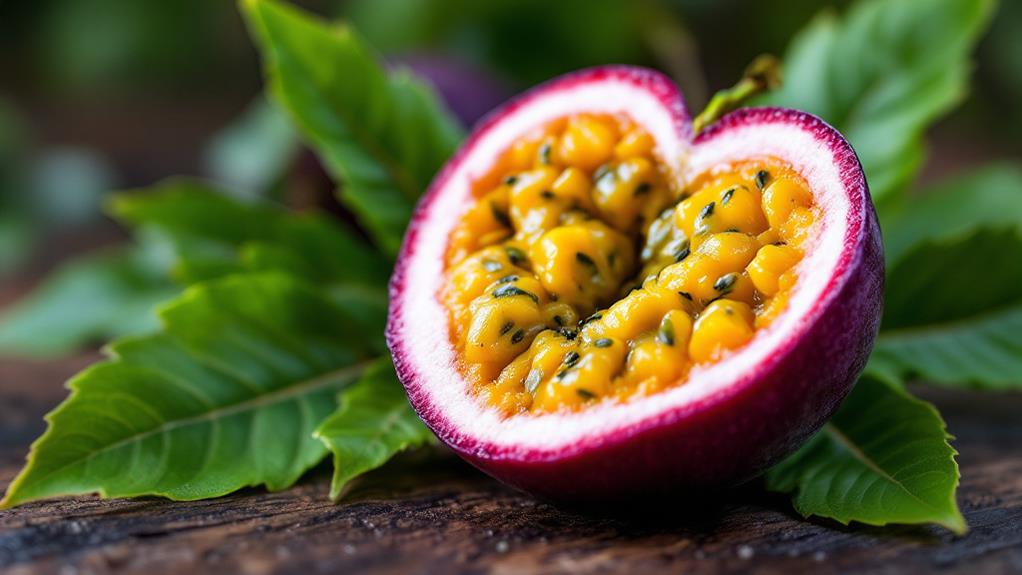
A heart-healthy diet includes passion fruit, which is packed with dietary fiber that helps lower cholesterol levels and improves circulation. By incorporating this tropical superfood into your meals, you can enhance your heart health considerably. The fiber content in passion fruit plays a vital role in reducing your cholesterol levels, which is fundamental in preventing cardiovascular diseases. Better circulation is another benefit, reducing the risk of heart-related issues.
Passion fruit is rich in antioxidants like carotenoids and polyphenols, which help reduce inflammation and oxidative stress linked to cardiovascular diseases. These antioxidants work to protect your heart by neutralizing harmful free radicals. Meanwhile, the potassium content in passion fruit supports healthy blood pressure levels, ensuring proper heart function. This small fruit packs a punch in keeping your blood pressure in check.
Vitamin C in passion fruit aids in maintaining blood vessel health and collagen production, further contributing to cardiovascular stability. Moreover, regular consumption of passion fruit may improve insulin sensitivity, potentially lowering the risk of diabetes-related heart complications. By including passion fruit in your diet, you're embracing a heart-friendly superfood that offers numerous benefits for your cardiovascular well-being.
Impact on Blood Sugar
Many people may not realize how beneficial passion fruit can be for managing blood sugar levels. This lively tropical fruit is more than just a delicious treat; it plays a significant role in maintaining metabolic health. Thanks to its low glycemic index, passion fruit helps minimize blood sugar spikes, making it an excellent choice for those managing diabetes. The high fiber content of passion fruit slows down sugar absorption into the bloodstream, offering better control over blood sugar levels. Here's how passion fruit can support your health:
- Low Glycemic Index: Keeps blood sugar spikes at bay.
- Improves Insulin Sensitivity: Compounds like piceatannol may reduce type 2 diabetes risk.
- Rich in Fiber: Slows sugar absorption for better control.
- Boosts Metabolic Health: Antioxidants and fiber help maintain stable energy levels.
- Supports a Balanced Diet: Ideal for maintaining balanced blood sugar levels.
Regular consumption of passion fruit can be a game-changer for your metabolic health. Its antioxidants and fiber contribute to stable energy levels, which is essential for those requiring consistent energy throughout the day. By incorporating passion fruit into your diet, you're making a healthy choice toward maintaining balanced blood sugar levels.
Culinary Uses
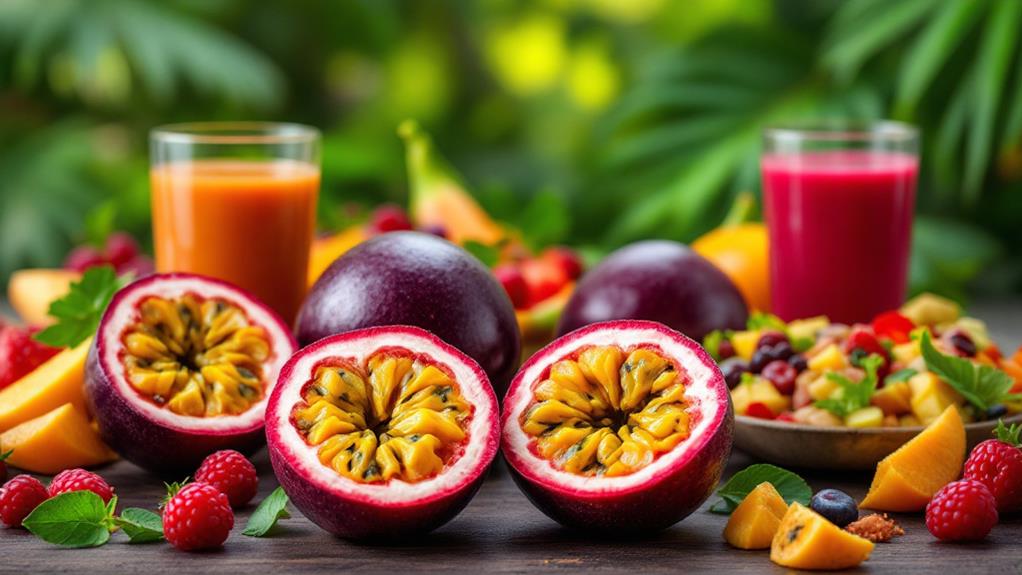
In regards to culinary versatility, passion fruit shines with its unique sweet and tart flavor profile. You can enjoy it raw by slicing it in half and scooping out the juicy pulp and seeds, making it a delightful enhancement to your meals. Concerning smoothies, passion fruit adds a tropical twist, perfectly complementing other tropical fruits like mango and avocado. It works wonders in tropical breakfast smoothies and sorbets, enhancing the dish's flavor and nutritional value.
For desserts, passion fruit is a star ingredient. Its pulp brings a revitalizing zing to treats like cheesecakes, meringues, and fruit tarts. If you're into beverages, passion fruit elevates your drink game up a notch. It's a fantastic enhancement to cocktails, especially when you use passion fruit puree in cocktail mixers. Try elevating a simple Prosecco with a splash of this puree for a sophisticated twist.
Don't forget about its role in fruit salads and sauces. The seeds offer a crunchy texture, making salads and yogurt more exciting, while the blended pulp creates flavorful sauces. With passion fruit, you're not just adding flavor—you're enhancing the nutritional value and sensory experience of your dishes.
Consumption Considerations
When enjoying passion fruit, it's vital to be aware of a few consumption considerations. Initially, always select ripe passion fruit, as unripe fruit contains cyanogenic glycosides that can be toxic in high amounts. If you're prone to latex allergies, be cautious. Passion fruit can cause cross-reactivity, potentially triggering an allergic response.
Here are some key points to remember:
- Ripe passion fruit: Verify the fruit is ripe to avoid toxicity.
- Latex allergy: Be vigilant if you have latex sensitivities.
- High fiber content: Consume in moderation to prevent digestive discomfort.
- Sugar concentration: Limit juice intake due to its high sugar levels.
- Edible seeds: While nutritious, they can be a choking hazard for children.
Moderation is significant when incorporating passion fruit into your diet. Its high fiber content can cause digestive discomfort if you're not used to it. Also, be mindful of the sugar concentration in passion fruit juice, as it can impact blood sugar levels. Finally, the seeds are edible and nutritious but supervise young children to prevent choking hazards. By considering these factors, you can enjoy passion fruit safely and healthily.
Passion Fruit Varieties
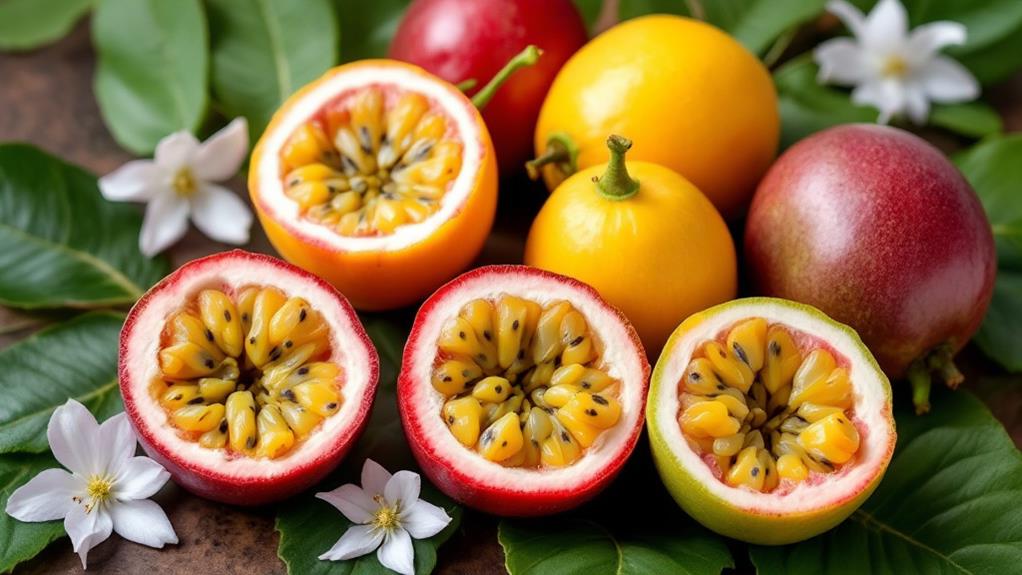
Passion fruit comes in a selection of types, each with its unique characteristics and flavors. Among the most common passion fruit varieties are Passiflora edulis and Passiflora flavicarpa. The former is renowned for its purple skin and intense flavor, while the latter boasts a larger size and yellow skin. Purple passion fruit, such as Black Knight and Red Rover, are valued for their aromatic and flavorful pulp. On the other hand, yellow varieties like Brazilian Golden are known for their pleasantly fragrant juices.
Sweet granadilla, often appearing in shades from yellow to orange, is another delightful variety. It offers a milder and typically sweeter taste compared to its purple counterparts. Different regions have their own unique passion fruit varietals. For example, Florida grows Possum Purple and Sweet Sunrise, whereas Australia is home to Australian Purple and Panama Gold.
The edible parts of passion fruit, including the juicy pulp and crunchy seeds, provide numerous health benefits. These can be easily incorporated into a range of culinary creations. By exploring different passion fruit varieties, you can enjoy a spectrum of flavors and health benefits, making this tropical superfood a versatile enhancement to your diet.

